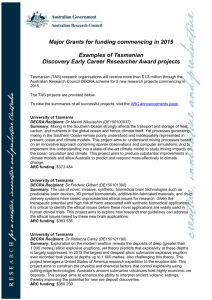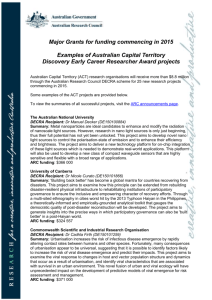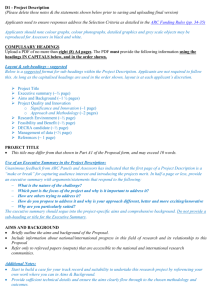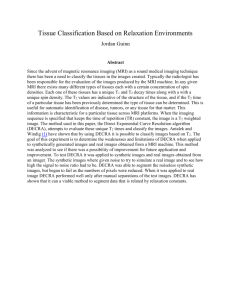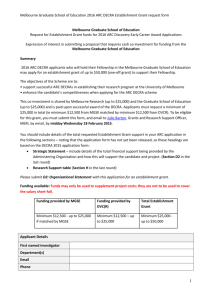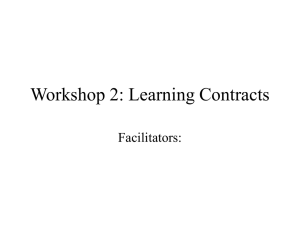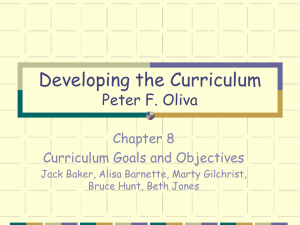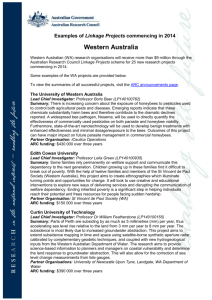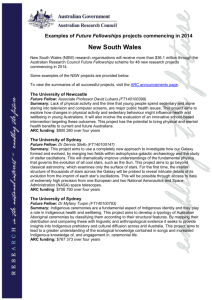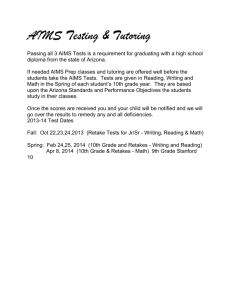Word Format - Australian Research Council
advertisement
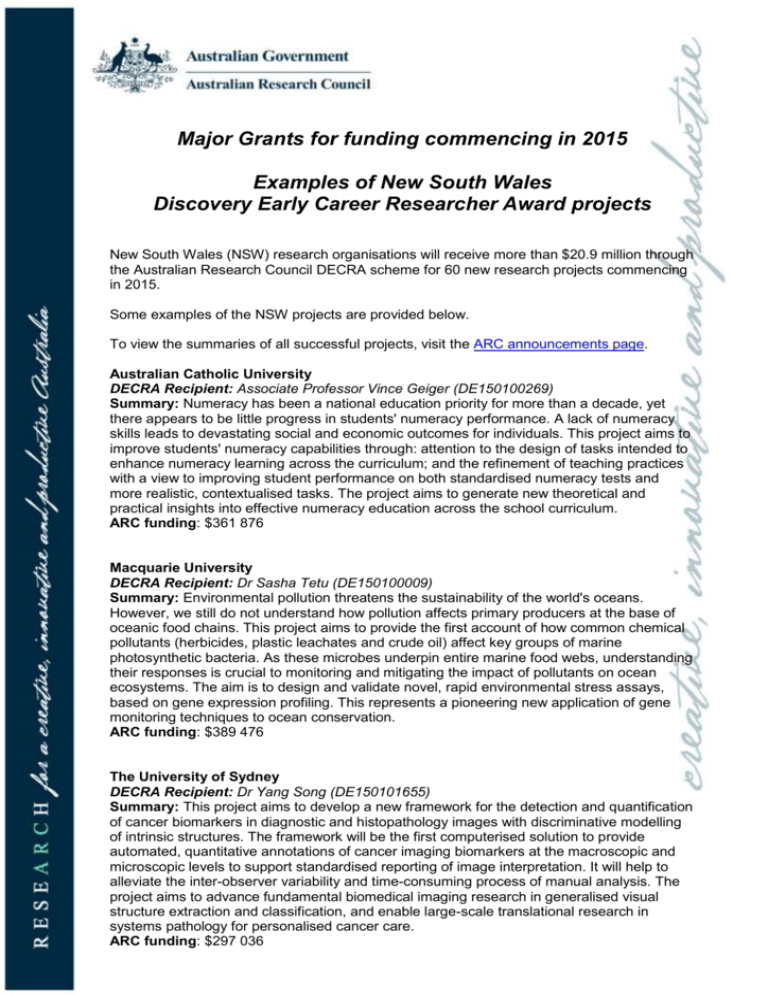
Major Grants for funding commencing in 2015 Examples of New South Wales Discovery Early Career Researcher Award projects New South Wales (NSW) research organisations will receive more than $20.9 million through the Australian Research Council DECRA scheme for 60 new research projects commencing in 2015. Some examples of the NSW projects are provided below. To view the summaries of all successful projects, visit the ARC announcements page. Australian Catholic University DECRA Recipient: Associate Professor Vince Geiger (DE150100269) Summary: Numeracy has been a national education priority for more than a decade, yet there appears to be little progress in students' numeracy performance. A lack of numeracy skills leads to devastating social and economic outcomes for individuals. This project aims to improve students' numeracy capabilities through: attention to the design of tasks intended to enhance numeracy learning across the curriculum; and the refinement of teaching practices with a view to improving student performance on both standardised numeracy tests and more realistic, contextualised tasks. The project aims to generate new theoretical and practical insights into effective numeracy education across the school curriculum. ARC funding: $361 876 Macquarie University DECRA Recipient: Dr Sasha Tetu (DE150100009) Summary: Environmental pollution threatens the sustainability of the world's oceans. However, we still do not understand how pollution affects primary producers at the base of oceanic food chains. This project aims to provide the first account of how common chemical pollutants (herbicides, plastic leachates and crude oil) affect key groups of marine photosynthetic bacteria. As these microbes underpin entire marine food webs, understanding their responses is crucial to monitoring and mitigating the impact of pollutants on ocean ecosystems. The aim is to design and validate novel, rapid environmental stress assays, based on gene expression profiling. This represents a pioneering new application of gene monitoring techniques to ocean conservation. ARC funding: $389 476 The University of Sydney DECRA Recipient: Dr Yang Song (DE150101655) Summary: This project aims to develop a new framework for the detection and quantification of cancer biomarkers in diagnostic and histopathology images with discriminative modelling of intrinsic structures. The framework will be the first computerised solution to provide automated, quantitative annotations of cancer imaging biomarkers at the macroscopic and microscopic levels to support standardised reporting of image interpretation. It will help to alleviate the inter-observer variability and time-consuming process of manual analysis. The project aims to advance fundamental biomedical imaging research in generalised visual structure extraction and classification, and enable large-scale translational research in systems pathology for personalised cancer care. ARC funding: $297 036 University of Wollongong DECRA Recipient: Dr Christine Eriksen (DE150100242) Summary: Bushfire emergencies in Australia have social, ethical and political, as well as biophysical causes. Hidden in embedded vulnerability, social norms and institutional structures, these causes are often critical obstacles to building resilient communities. This project aims to identify key ways to heighten resilience by examining how sacred and secular faith affects the ability of individuals and communities to prepare for, respond to and recover from bushfires. Using ethnographic methods, this project will critically examine evidence of bushfire vulnerability, resilience and adaptation strategies driven by, retained in, or promoted through faith and ethics. ARC funding: $353 773 The University of Newcastle DECRA Recipient: Dr Amy Waller (DE150101262) Summary: End of life care provides an ideal framework in which to explore the principle of individual autonomy and consumer decision making. Older people at a high risk of dying in 6 months will be recruited from acute care wards, and asked about preferences for involvement in end of life decision making in a standardised interview survey. Surrogate decision makers and physicians will be asked to answer the same questions from the patient's perspective (namely what they think the patient wants). Findings will suggest ways end of life care can be better tailored so that patients can participate in decisions and receive care that is consistent with their wishes. ARC funding: $359 753 Macquarie University DECRA Recipient: Dr Celia Harris (DE150100396) Summary: Older couples remember more together than apart, but little is known about mechanisms underlying such collaborative benefits. Collaborative remembering may have therapeutic value in age-related cognitive decline and dementia, providing cost-effective, readily-available memory support. However there are several 'active ingredients' that may underlie collaborative benefits and not all of these will be equally effective or translatable into therapy. This project aims to identify and evaluate these active ingredients, teasing apart 'what', 'who' and 'how'. Testing younger and older couples, healthy and in early stages of decline, this project aims to generate new knowledge and provide a basis for future therapies utilising collaborative remembering. ARC funding: $342 000 University of Technology, Sydney DECRA Recipient: Dr Nicholas Hopwood (DE150100365) Summary: Children born into circumstances of socio-economic disadvantage are at risk of missing out on the developmental, educational and social opportunities that give them the best possible start in life. By helping parents in disadvantaged families to cope with adversity, parent education services can mitigate these risks, build resilience in families, and change children's prospects for the future. This project aims to identify the most effective ways that parent educators can create lasting positive impacts for families. This project also aims to find out what needs to change to make these best practices more widespread and cost effective, including learning from study of low-cost community-based services. ARC funding: $371 000 University of Wollongong DECRA Recipient: Dr Rute Santos (DE150101921) Summary: The levels of sedentary behaviour are now alarmingly high in toddlers, yet little is known about the effect of this behaviour on cognitive development and executive functions during early childhood. This 15 month cluster randomised controlled trial will examine the effects of reduced sitting time on cognitive development and executive functions in Australian toddlers from low socio-economic families. This project aims to develop and implement evidence-based strategies and policies designed to optimise developmental and health outcomes in young children, specifically in those from a low socio-economic status, thus giving young children the best start in life. ARC funding: $357 000
